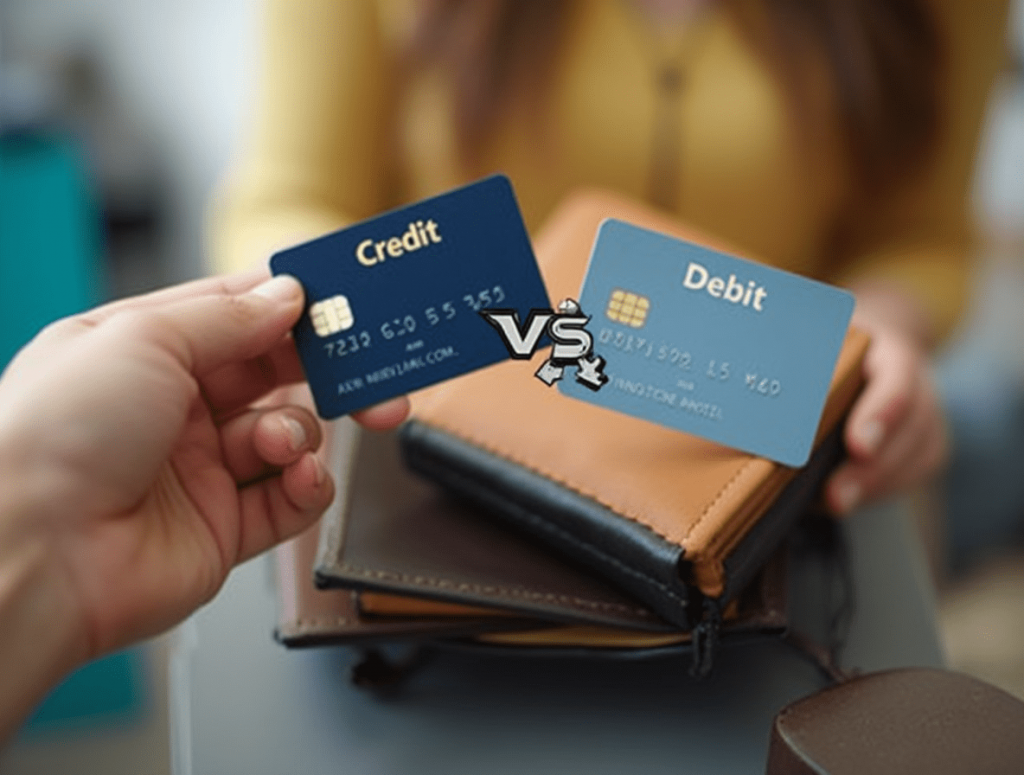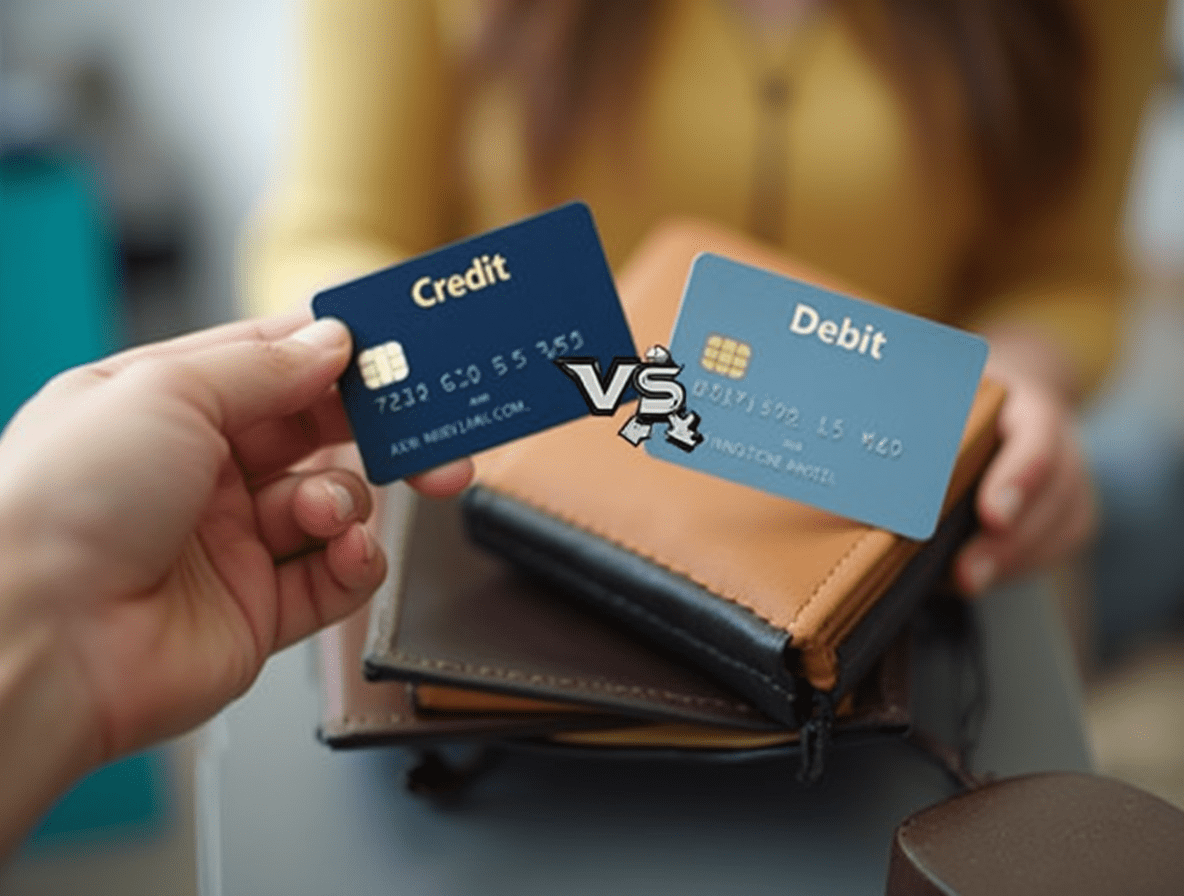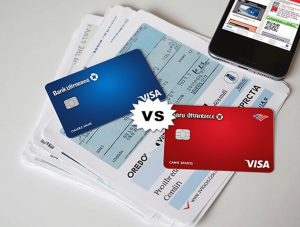
Introduction: The Daily Payment Dilemma
Every time you approach the checkout counter or make an online purchase, you face the same decision: should you reach for your credit card or your debit card? This choice, while seemingly simple, can have significant implications for your financial health, security, and even your credit score.
According to the Federal Reserve, Americans conduct over 100 billion card transactions annually, yet many consumers make their payment choice out of habit rather than strategy. Understanding the fundamental differences between these payment tools can help you make more informed decisions that align with your financial goals.
In this comprehensive guide, we’ll explore the key features, benefits, and potential drawbacks of both credit and debit cards. By the end, you’ll have a clear understanding of which card might serve you better in different situations, helping you optimize your personal finance strategy.
Understanding the Basics: Credit Cards vs. Debit Cards
What Is a Credit Card?
A credit card allows you to borrow money from a financial institution up to a predetermined limit. When you make a purchase with your credit card, you’re essentially using the card issuer’s money, which you’ll need to repay later. Credit cards operate on a revolving credit line, meaning you can continue to use available credit as you pay down your balance.
The key defining characteristic of credit cards is that they do not immediately withdraw funds from your bank account. Instead, you receive a monthly statement and must make at least a minimum payment by the due date. If you don’t pay the full balance, you’ll typically accrue interest charges on the remaining amount.
What Is a Debit Card?
A debit card, in contrast, is directly linked to your checking account. When you make a purchase with a debit card, the funds are immediately withdrawn from your bank account. There’s no borrowing involved—you’re spending your own money in real-time.
Debit cards usually require a PIN (Personal Identification Number) for security, although many now offer a “credit” processing option that requires a signature instead. Despite this option, the transaction still draws directly from your bank account.
Key Differences: Credit Cards vs. Debit Cards
1. Source of Funds
Credit Cards: When you use a credit card, you’re borrowing money from the card issuer. This borrowed amount becomes part of your credit card balance, which you’ll need to repay.
Debit Cards: With a debit card, you’re using your own money that’s already in your bank account. The transaction immediately reduces your available balance.
2. Impact on Credit Score
Credit Cards: Credit card usage is reported to credit bureaus and has a significant impact on your credit score. Responsible use—paying on time and keeping balances low—can help build excellent credit.
Debit Cards: Debit card transactions do not affect your credit score because you’re not borrowing money. They generally aren’t reported to credit bureaus.
3. Fees and Interest
Credit Cards:
- Annual fees (though many cards offer no-annual-fee options)
- Interest charges on unpaid balances (often 15-24% APR)
- Late payment fees
- Balance transfer fees
- Cash advance fees
Debit Cards:
- Few or no annual fees
- No interest charges (since you’re not borrowing)
- Overdraft fees if you spend more than your available balance
- ATM fees when using out-of-network machines
4. Fraud Protection and Security
Credit Cards: Federal law limits your liability for unauthorized charges to $50, and many issuers offer zero-liability protection. Additionally, since credit transactions don’t immediately withdraw your money, you have time to dispute fraudulent charges before your funds are affected.
Debit Cards: While banks have improved protections, your liability can be higher depending on how quickly you report the fraud. More importantly, fraudulent transactions immediately remove money from your account, potentially causing financial disruption while the dispute is resolved.
When to Use a Credit Card
Advantages of Credit Cards
Building Credit History
Credit cards are one of the most accessible tools for establishing and improving your credit score. Consistent, responsible use demonstrates to lenders that you can manage debt responsibly, potentially leading to better terms on future loans for major purchases like homes or vehicles.
Rewards and Perks
Many credit cards offer significant rewards programs, including:
- Cash back on purchases (typically 1-5%)
- Travel points or miles
- Statement credits
- Shopping discounts
- Extended warranties on purchases
- Purchase protection against damage or theft
- Travel insurance
Enhanced Purchase Protection
Credit cards typically offer better consumer protections than debit cards:
- Ability to dispute charges if goods aren’t delivered as promised
- Extended warranty coverage
- Purchase protection against damage or theft
- Price protection (on some cards)
Fraud Protection
As mentioned earlier, credit cards offer stronger fraud protection. If your card is compromised, your actual money isn’t at risk while the dispute is being resolved.
Short-Term Financing
Credit cards can provide interest-free financing if you pay your balance in full each month. Even for larger purchases, many cards offer 0% introductory APR periods, allowing you to spread payments over time without incurring interest.
When Credit Cards Make the Most Sense
- Online shopping: The enhanced fraud protection makes credit cards safer for online transactions.
- Travel expenses: Travel rewards, rental car insurance, and foreign transaction policies often make credit cards the better choice when traveling.
- Large purchases: Extended warranties, purchase protection, and the ability to dispute charges provide extra security for significant expenditures.
- Regular expenses you can pay in full: Using a credit card for routine expenses like groceries and gas can earn substantial rewards, provided you pay off the balance monthly.
- Building credit: Strategic use of credit cards can help establish or improve your credit history.
When to Use a Debit Card
Advantages of Debit Cards
Spending Control
Debit cards help enforce discipline by limiting spending to available funds. This can be especially valuable for those working to stick to a budget or avoid debt.
No Risk of Debt or Interest
Since debit cards use money you already have, there’s no risk of accruing interest charges or falling into debt cycles.
Immediate Transaction Recording
Debit card transactions appear in your bank account immediately, making it easier to track spending in real-time.
Cash Access
Debit cards provide convenient access to cash through ATMs, often without fees when using your bank’s network.
Acceptance Where Credit Cards Aren’t
Some small businesses, especially those with tight margins, may accept debit cards but charge additional fees for credit cards.
When Debit Cards Make the Most Sense
- ATM withdrawals: Debit cards are designed for cash access, often without fees at in-network ATMs.
- Budget management: If you’re working to control spending, the immediate withdrawal of funds provides a natural spending limit.
- Daily small purchases: For minor transactions where fraud protection is less critical, debit cards work well.
- Merchants with credit card surcharges: Some businesses charge extra for credit card use, making debit the more economical choice.
- When you want to avoid temptation: If you’re prone to overspending with credit, using debit enforces discipline.
Strategic Card Usage: Creating Your Optimal Approach
Rather than viewing credit and debit cards as competitors, consider them complementary tools in your financial toolkit. Here’s a strategic approach to maximize the benefits of both:
The Hybrid Approach
- Use credit cards for:
- Online purchases
- Travel expenses
- Large purchases where protection matters
- Regular expenses you can fully pay off monthly
- Situations where you’re actively working to build credit
- Use debit cards for:
- Cash withdrawals
- Small, everyday purchases
- Spending in categories where you tend to overspend
- Places with credit card surcharges
- When you need to strictly adhere to a budget
Setting Up Safeguards
Regardless of which card you choose to use more frequently, establishing certain safeguards can enhance your financial security:
- Set up alerts: Configure notifications for all card transactions to quickly identify unauthorized charges.
- Use digital wallets: Services like Apple Pay, Google Pay, and Samsung Pay add an extra layer of security by using tokenization rather than transmitting your actual card number.
- Monitor statements regularly: Review your transactions at least weekly to spot unusual activity.
- Use strong, unique passwords: Protect your online banking and card accounts with secure passwords.
- Enable two-factor authentication: Add this extra security layer to all financial accounts when available.
The Bottom Line: Making the Right Choice for Your Financial Situation
The “right” card to use more frequently depends on your personal financial situation, habits, and goals. Here are some guidelines based on common financial profiles:
If you’re focused on building credit: Prioritize credit card use for regular expenses you can pay in full each month.
If you’re working to control spending: Lean more heavily on debit cards while perhaps using credit selectively for specific categories where you maintain discipline.
If you’re financially stable with good credit habits: Maximize credit card rewards by using them for most purchases, while keeping debit as a backup for cash access and certain merchants.
If you’re rebuilding after financial difficulties: Consider a balanced approach, using debit for most purchases while carefully rebuilding credit with limited, planned credit card use.
Remember that the most powerful approach combines both tools strategically rather than relying exclusively on either one.
Conclusion: The Power of Informed Choice
The credit versus debit decision isn’t about finding a single “best” card for all situations. Instead, it’s about understanding the unique strengths and limitations of each payment tool and deploying them strategically based on your financial goals and circumstances.
By making intentional choices about when to use credit versus debit, you can enhance your financial security, maximize rewards, build credit history, and maintain spending discipline. This balanced approach transforms your everyday payment decisions from unconscious habits into strategic steps toward your broader financial objectives.
The next time you reach for your wallet, take a moment to consider which card truly serves your needs for that specific purchase. Over time, these small but intentional choices can make a meaningful difference in your overall financial health.
FAQ: Common Questions About Credit and Debit Cards
Can using a debit card help build credit?
No, debit card transactions aren’t reported to credit bureaus since you’re not borrowing money. If building credit is your goal, responsible credit card use is more effective.
Is it safer to use credit cards online?
Generally, yes. Credit cards offer stronger fraud protections, and fraudulent charges don’t immediately impact your bank balance while being resolved.
Should I use my credit card if I can’t pay the full balance?
It’s best to avoid carrying a balance due to high interest rates. However, if you must carry a balance temporarily, consider cards with low interest rates or 0% introductory offers.
Do merchants prefer debit or credit cards?
Merchants typically pay lower processing fees for debit transactions, which is why some small businesses offer discounts for cash or debit purchases.
Is it better to use credit or debit cards while traveling internationally?
Credit cards often offer better exchange rates and fewer foreign transaction fees. Many travel-focused credit cards specifically eliminate these fees entirely.
Can I use my debit card as a credit card?
When you select “credit” at checkout with a debit card, you’re choosing the processing network (like Visa or Mastercard) rather than converting it to a true credit transaction. The funds still come directly from your bank account.














